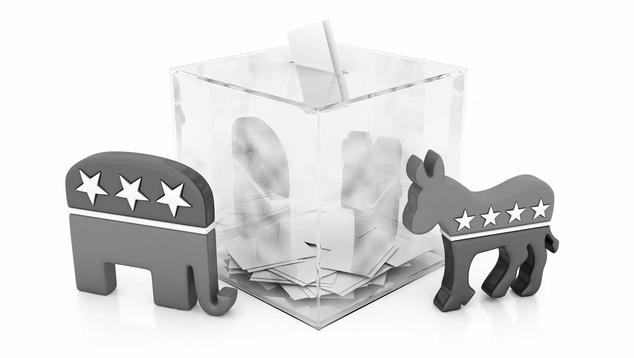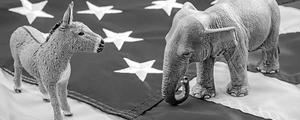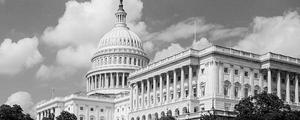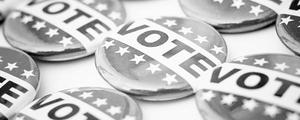Story Highlights
- 47% of U.S. adults identify as Democrats or lean Democratic
- 42% identify as Republican or lean Republican
- 5-percentage-point edge in line with recent trends
WASHINGTON, D.C. -- More Americans continue to identify as Democrats or as "Democratic-leaning" independents than as Republicans or "Republican-leaning" independents. The current 47% to 42% Democratic edge is largely in line with what Gallup has measured over the past five years. It is slightly less than the 8-percentage-point Democratic lead in the first quarter of this year, but slightly larger than the three-point gap in the second quarter of this year.
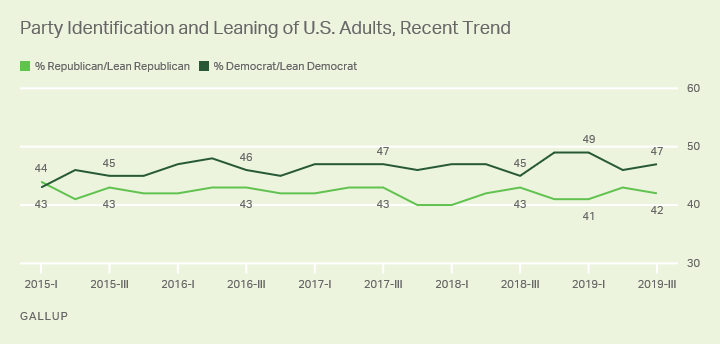
The results are based on quarterly averages of Gallup Poll party affiliation data. In the third quarter, Gallup interviewed more than 12,000 U.S. adults and more than 6,000 in each of the first two quarters of 2019.
In each survey, Gallup asks U.S. adults whether they identify politically as Republicans, Democrats or independents. Those who say they are independent are then asked whether they lean more to the Democratic or Republican Party. The measure reported here combines the percentage of identifiers and leaners for each party.
Over the past five years, Democrats have averaged a four-percentage-point advantage in party identification and leaning. The notable departures from that were a 1-point Republican lead in the first quarter of 2015 after the GOP won control of the U.S. Senate in the 2014 midterm elections, and 8-point Democratic advantages in late 2018 and early 2019.
Longer term, Democrats have typically maintained a slight advantage back to 1991, when Gallup regularly began measuring independents' partisan leanings.
Democratic Advantage in Partisanship Among Largest at Similar Points in Time
U.S. partisanship gives an indication of relative strength of each party heading into next year's presidential election, as vote preference is highly correlated with partisanship. Although Democrats usually hold an advantage in partisanship, Republicans vote at higher rates than Democrats do, which makes U.S. elections competitive.
Partisanship in the third quarter of the year prior to a presidential election year has not always been a strong predictor of what would happen in the coming election. Nevertheless, the current Democratic advantage is among the larger ones for the party over the past two decades. Democrats held larger advantages in 1999 (six points) and 2007 (10 points). The party won the popular vote but lost the Electoral College vote in the 2000 election and won both in 2008.
In other years, the parties were more evenly matched, with the ensuing elections resulting in a mix of Republican (2004, 2016) and Democratic (1992, 1996, 2012) victories.
| Democrat/Lean Democratic | Republican/Lean Republican | Democratic advantage | |||||||||||||||||||||||||||||||||||||||||||||||||||||||||||||||||||||||||||||||||||||||||||||||||
|---|---|---|---|---|---|---|---|---|---|---|---|---|---|---|---|---|---|---|---|---|---|---|---|---|---|---|---|---|---|---|---|---|---|---|---|---|---|---|---|---|---|---|---|---|---|---|---|---|---|---|---|---|---|---|---|---|---|---|---|---|---|---|---|---|---|---|---|---|---|---|---|---|---|---|---|---|---|---|---|---|---|---|---|---|---|---|---|---|---|---|---|---|---|---|---|---|---|---|---|
| % | % | pct. pts. | |||||||||||||||||||||||||||||||||||||||||||||||||||||||||||||||||||||||||||||||||||||||||||||||||
| 1991 | 48 | 49 | -1 | ||||||||||||||||||||||||||||||||||||||||||||||||||||||||||||||||||||||||||||||||||||||||||||||||
| 1995 | 44 | 44 | 0 | ||||||||||||||||||||||||||||||||||||||||||||||||||||||||||||||||||||||||||||||||||||||||||||||||
| 1999 | 47 | 42 | 5 | ||||||||||||||||||||||||||||||||||||||||||||||||||||||||||||||||||||||||||||||||||||||||||||||||
| 2003 | 46 | 45 | 1 | ||||||||||||||||||||||||||||||||||||||||||||||||||||||||||||||||||||||||||||||||||||||||||||||||
| 2007 | 51 | 39 | 12 | ||||||||||||||||||||||||||||||||||||||||||||||||||||||||||||||||||||||||||||||||||||||||||||||||
| 2011 | 46 | 45 | 1 | ||||||||||||||||||||||||||||||||||||||||||||||||||||||||||||||||||||||||||||||||||||||||||||||||
| 2015 | 45 | 43 | 2 | ||||||||||||||||||||||||||||||||||||||||||||||||||||||||||||||||||||||||||||||||||||||||||||||||
| 2019 | 47 | 42 | 5 | ||||||||||||||||||||||||||||||||||||||||||||||||||||||||||||||||||||||||||||||||||||||||||||||||
| Gallup | |||||||||||||||||||||||||||||||||||||||||||||||||||||||||||||||||||||||||||||||||||||||||||||||||||
Implications
Democrats are heading into the presidential election year in a relatively strong position compared with Republicans. The Democratic Party is also in a more advantageous position than they have been at similar points in the past. However, their positioning is slightly weaker than it was at the end of 2018 and beginning of 2019.
Americans' party preferences have often shifted in the year leading up to Election Day. Thus, movement toward a larger Democratic advantage, or a smaller one, would certainly not be unexpected. Which direction such a shift will go a long way to determining whether President Trump earns a second term or is replaced by a Democratic president.
Learn more about how the Gallup Poll Social Series works.
